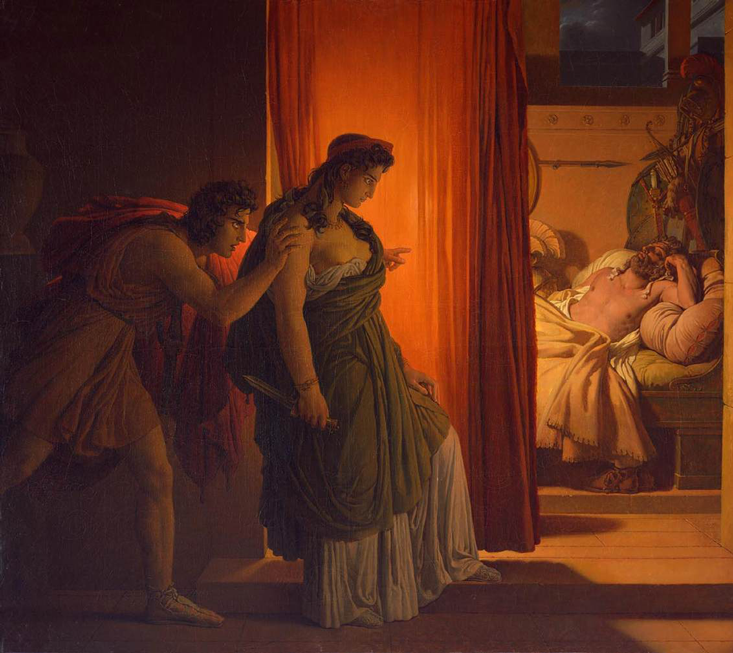In the first lines of Sophocles’ Antigone, the title character bemoans her fate to the chorus:
How many miseries our father caused!
And is there one of them that does not fall
On us while yet we live?
Antigone must reckon with the choices her father Oedipus made and the slippery, obscure moral inheritance that he leaves her. She ultimately chooses to pay with her life, not for her sins, but for her father’s.
Children reckoning with and reenacting the sins of their forebears is a key part of the tragic form. The great Greek tragedians—Aeschylus, Sophocles, Euripides—incorporated ancestral fault into their works, as Orestes, Electra, and Antigone reap what their powerful but monumentally flawed parents sow. The Greeks took the idea of moral inheritance well past the stage, weaving it into the fabric of their society, from elegiac poetry to philosophical treatises to medical literature. Ancient Greek philosophers like Hermias and Proclus were known to have used medical imagery to illustrate the concept of delayed punishment.1
The data are showing us that descendants undoubtedly bear the imprints of ancestral violence.
In the ensuing centuries, belief in hereditary curses was gradually replaced by newer religions, philosophies, and dogmas. In the West, the idea of inheritable sin was first subsumed by the Christian tenet of original sin, and then mostly discarded by Enlightenment ideals of rationality and personal liberty. While we were encouraged to understand our parents’ histories, our future was our own to create. Curses became a thing of the past.
Ironically, though, new life is being breathed into the idea of the hereditary curse by one of the highest achievements of the Enlightenment: modern science.

Brian Dias noticed something unusual about a group of lab mice he was breeding at Emory University: They were afraid of the smell of acetophenone, even though they’d never been exposed to it before.
Dias was studying how ancestral environments leave imprints on descendant generation. He administered a mild shock to a group of mice whenever they were given the scent of acetophenone, five times a day for three days. A week and a half later, he had those mice mate with females. Their offspring grew up with a high sensitivity to acetophenone, despite having no experience with the compound. The following generation was also unusually skittish around acetophenone. Dias also discovered that all three generations devoted a higher-than-average number of olfactory receptors to detecting the odor compared to mice in a control group.
The mice were inheriting the fears of their ancestors. “Descendants bear the imprints of ancestral traumas,” he says.
The study of alterations in gene expression caused by environmental factors and experience is called epigenetics. Epigenetic modifications switch specific genes on and off, often through methylation of the cytosine nucleotide. Even though the DNA sequences themselves don’t change, epigenetic changes can sometimes be passed down to offspring. The extent of this inheritance is debated: The University of Massachusetts molecular biologist Oliver Rando asked in a Nature article just last year “why hasn’t this been obvious to all the brilliant researchers in the past hundred years of genetics?”2
But epigenetic modifications may be passed on in a variety of ways. A study led by Frances Champagne in 2006 found that neglectful mothering in rats caused DNA methylation of estrogen receptors in female offspring.3 When the neglected female rats grew up and had babies of their own, their decreased estrogen levels caused them to neglect their newborns, just as their mothers had. This was inheritance through behavior, rather than direct DNA-to-DNA transmission.
Even when a hero does appear to exert agency it is only to ultimately reveal his powerlessness.
Perhaps the most infamous historical example of epigenetics in humans comes from an episode at the end of World War II called the Dutch Hunger Winter. In the winter of 1944-45 Germany created a man-made famine in the Netherlands. The Dutch kept careful records of families and births during the Hunger Winter, and were able to track the effects of that period of starvation on pregnant women. “Researchers followed their descendants through time and what they see is that there are certain windows in pregnancy where if mom is starved, the baby is at higher risk later in life for obesity and Type 2 diabetes,” says Barry Starr, a geneticist at Stanford University. “It’s almost as if that [period of starvation] has caused a change in the genetic pattern to need more food.”
Epigenetic effects in humans also extend to behavior. A 2007 study found that Holocaust survivors with post-traumatic stress disorder passed down to their children a genetic predisposition for the disorder.4 Other work by Rachel Yehuda, the director of the Traumatic Stress Studies Division at Mount Sinai Hospital, has shown that descendants of mothers who survived the Holocaust and 9/11 bear the imprints of ancestral traumas.
It isn’t just trauma that gets passed down. Science has shown us that our parents’ characters influence us deeply even in the course of a normal childhood.
Studies of twins beginning in the late 1970s found that genetic inheritance is responsible for up to 60 percent of the so-called big five personality traits: openness, conscientiousness, extraversion, neuroticism, and agreeableness. And in the past three decades we’ve learned that roughly 50 percent of the variance in aggression and aggressive behavior is hereditary.5 A 2009 meta-analysis by Sybil Alexandra Burt of 103 twin and adoption studies found a higher number, with about 65 percent heritability.6 Frighteningly, like blue eyes or fair complexion, violence is highly heritable.
Trauma and violence can also pass from parent to child without any genetic inheritance. John B. Watson was one of the earliest developmental psychologists to fall firmly in the behaviorism camp, which held that environmental and cultural influences shaped identity to a far greater extent than genes. In a bold declaration in his book Behaviorism, Watson argues that upbringing is paramount: “Give me a dozen healthy infants, well-formed, and my own specified world to bring them up in, and I’ll guarantee to take any one at random and train him to become any type of specialist I might select—doctor, lawyer, artist, merchant-chief, and, yes, even beggar-man and thief, regardless of his talents, penchants, tendencies, abilities, vocations, and race of his ancestors.”
Watson might downplay the genetic inheritance of trauma. But, if his contention that the actions and opinions of the parent set the direction of the child, would the ultimate effect be very different?
Watson’s audacious convictions informed psychologist Albert Bandura’s social learning theory. Working in the 1960s, Bandura posited that social behavior was in large part acquired through observation. In a series of now-famous experiments conducted in 1961 and 1963, Bandura put children in a playroom full of toys, with an adult model on the other side of the room. In one group, the adult model acted aggressively toward an inflatable Bobo doll, punching it, striking it with a mallet, and verbally abusing it. In the other group, the adult model played peacefully with the doll. When the children were then taken to a separate room and given the opportunity to play with their own Bobo doll, those who had been exposed to the violent model were more likely to be physically and verbally aggressive.
Children who observed violent behavior in adult models were far more likely to exhibit violent behavior themselves, with follow-up experiments showing that such violent behavior often persisted for months.7
By nature or nurture, we humans grow and live in the shadows of our parents and our upbringing—especially when it comes to trauma and tragedy.

On the face of it, the principles of the Enlightenment are directly opposed to those of Greek tragedy. Jean-Jacques Rousseau said that “everything is good as it leaves the hands of the Author of things; everything degenerates in the hands of man.” Like other Enlightenment thinkers, he believed that mankind’s nature was pure and uncorrupted, and that it was society and other men who spoiled it. Across Europe in that “long 18th century,” philosophers like Voltaire, Thomas Paine, and Adam Smith championed reason and self-determination over what they believed to be the old-world vulgarities of religious orthodoxy, superstition, and holy wars. Theirs was an ideal of self-improvement, rationality, and diligently employed free will. Through the Enlightenment lens, mankind was freed of the past.
The protagonists of the major Greek tragedies, on the other hand, are prisoners of fate, forced to play out hereditary curses and ancestral traumas. Their lives are anything but manifestations of free will and self-determination. And even when a hero does appear to exert agency—Sophocles’ Oedipus being the perfect example—it is only to ultimately reveal his powerlessness, or what Christopher Rocco calls “all the ambiguities and ironies of enlightenment itself.”8 The further Oedipus stretches his power of will, the harder it snaps back to his preordained destiny. It is not that the Greek tragedians were strangers to free will and self-actualization. They just understood that the traits that would eventually be glorified by the Enlightenment could not be accepted unilaterally; other forces were always at work.
In his 1999 essay “Ancestral Curses,” classical scholar Martin West decries other critics’ tendency to refer to the term inherited curse “when what they mean is inherited guilt, or some kind of genetic corruption, or persistent but unexplained adversity.” Ancestral curses, genetic corruption. The conflation is telling: Study both closely enough, and the line between them blurs. It’s the loaded connotations of the word “curse”—supernatural, occult, folkloric—that throw us off.
If we understand a curse as nothing more or less than that double helix snaking through our chromosomes, or the hard lessons of behaviorism, then how much has our understanding of fate really changed in two and a half millennia?
Mike Mariani is a writer and educator based in Hoboken, NJ. His work has appeared in The Atlantic, Newsweek, Pacific Standard, The Guardian, and others. You can follow him @mikesmariani.
References
1. Gagné, R. Ancestral Fault in Ancient Greece Cambridge University Press, New York, NY (2014).
2. Hughes, V. Epigenetics: the sins of the father. Nature 507, 22-24 (2014).
3. Champagne, F.A., et al. Maternal care associated with methylation of the estrogen receptor -α1b promoter and estrogen receptor-α expression in the medial preoptic area of female offspring. Endocrinology 147, 2909-2915 (2006).
4. Moore, M.S. Can PTSD become hereditary? Pacific Standard (2011).
5. Tuvblad, C. & Baker, L.A. Human aggression across the lifespan: Genetic propensities and environmental moderators. Advances in Genetics 75, 171-214 (2011).
6. Burt, S.A. Are there meaningful etiological differences within antisocial behavior? Results of a meta-analysis. Clinical Psychology Review 29, 163-178 (2009).
7. Nolen, J.L. Bobo doll experiment. Encyclopaedia Britannica.
8. Rocco, C. Tragedy and Enlightenment: Athenian Political Thought and the Dilemmas of Modernity University of California Press, Berkeley, CA (1997).






























